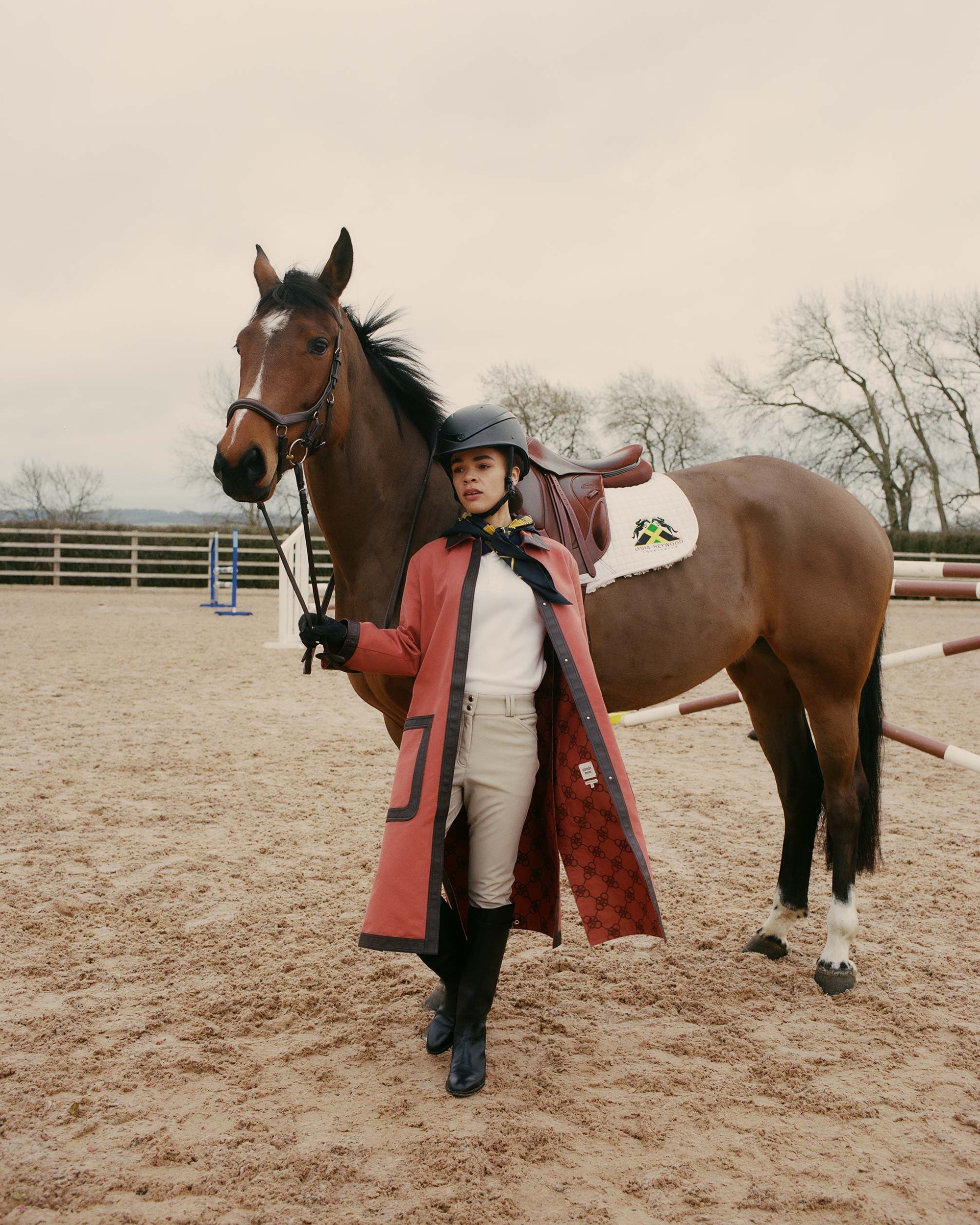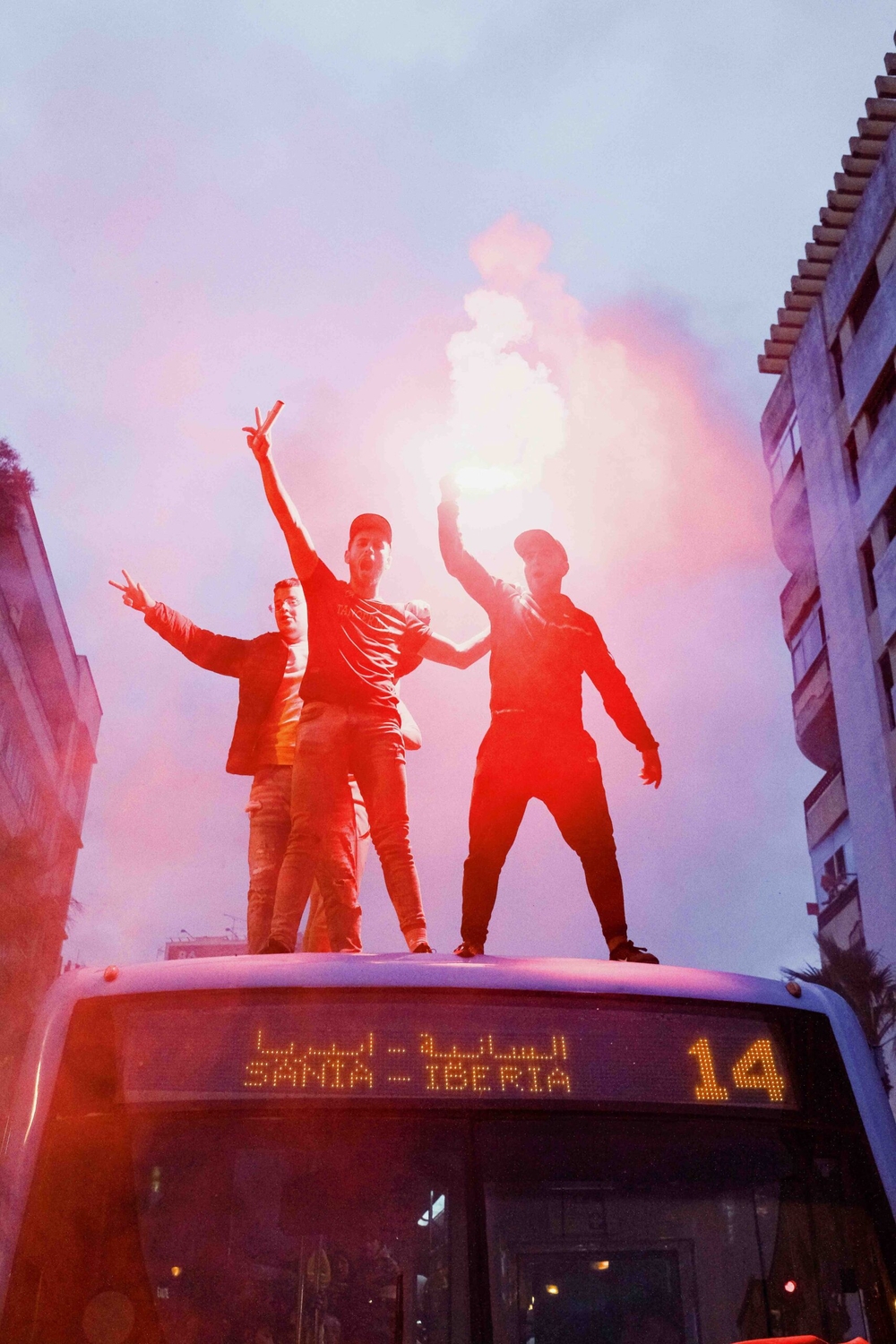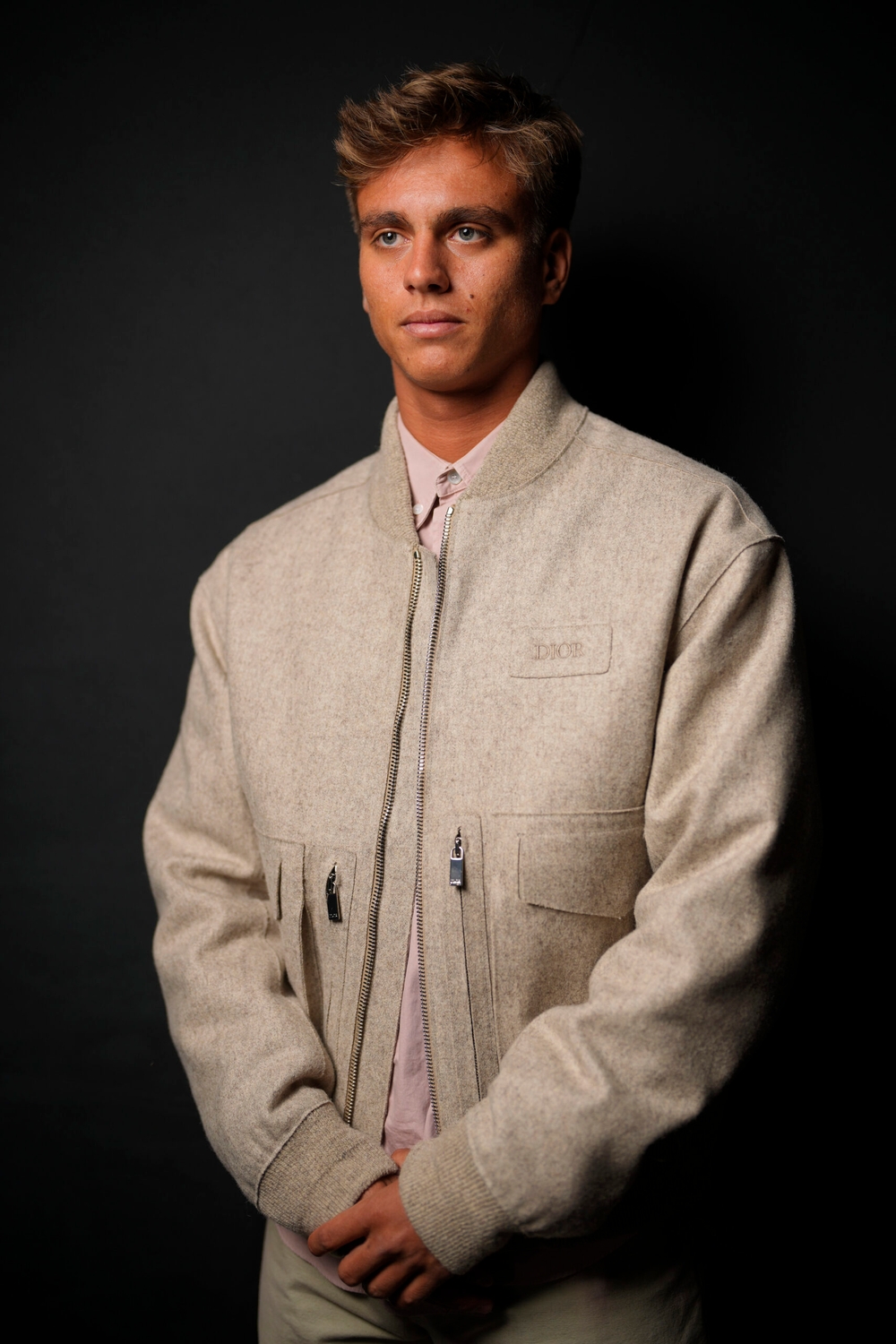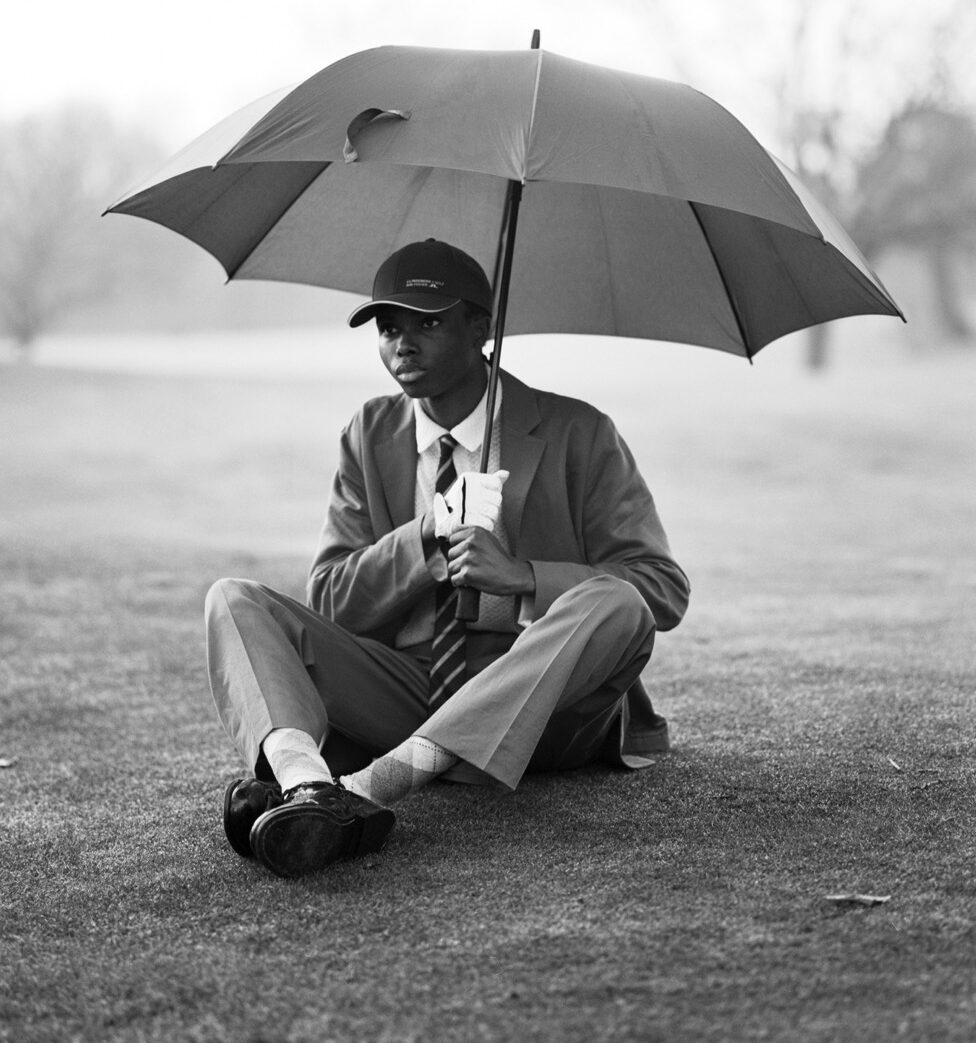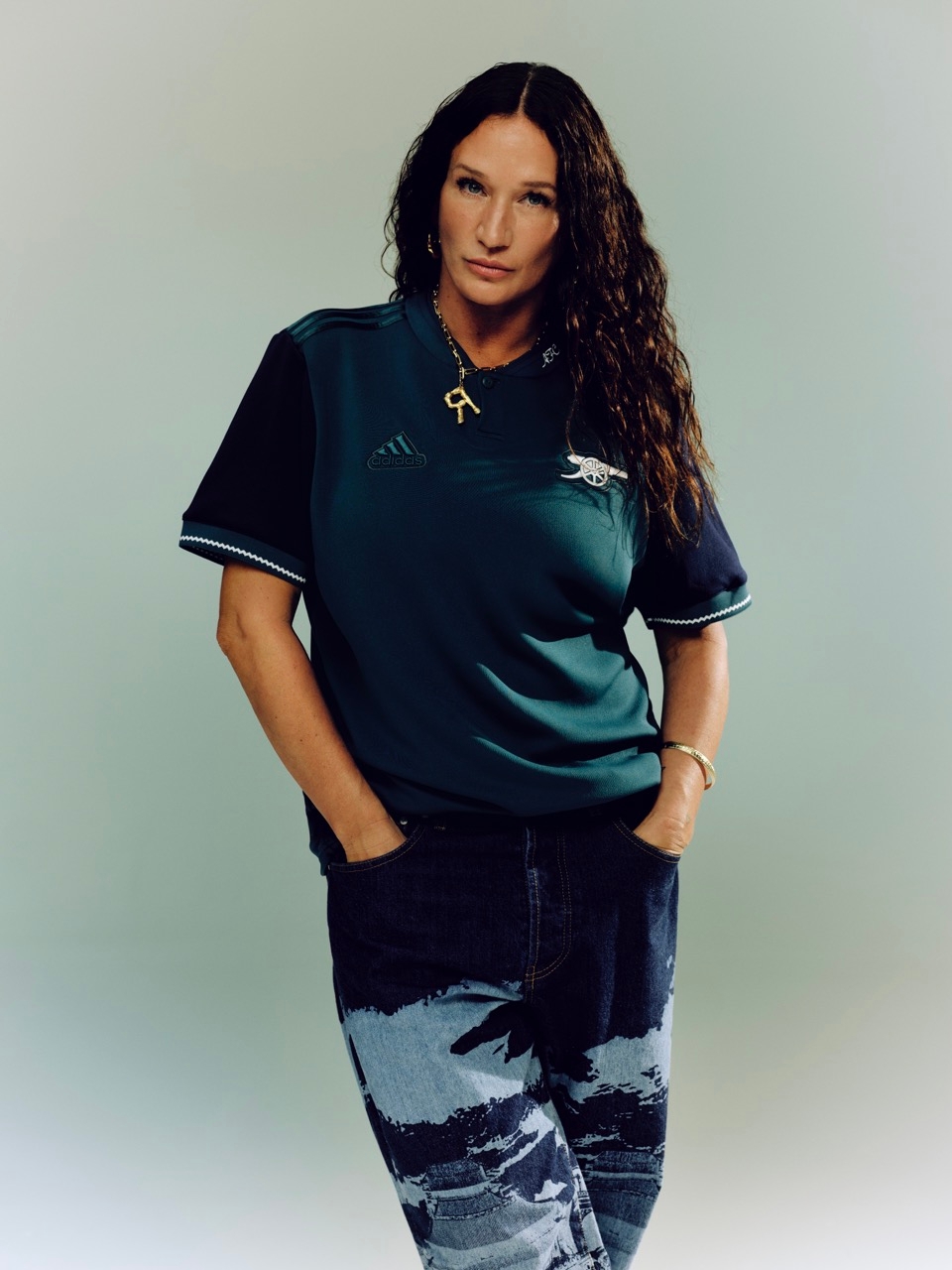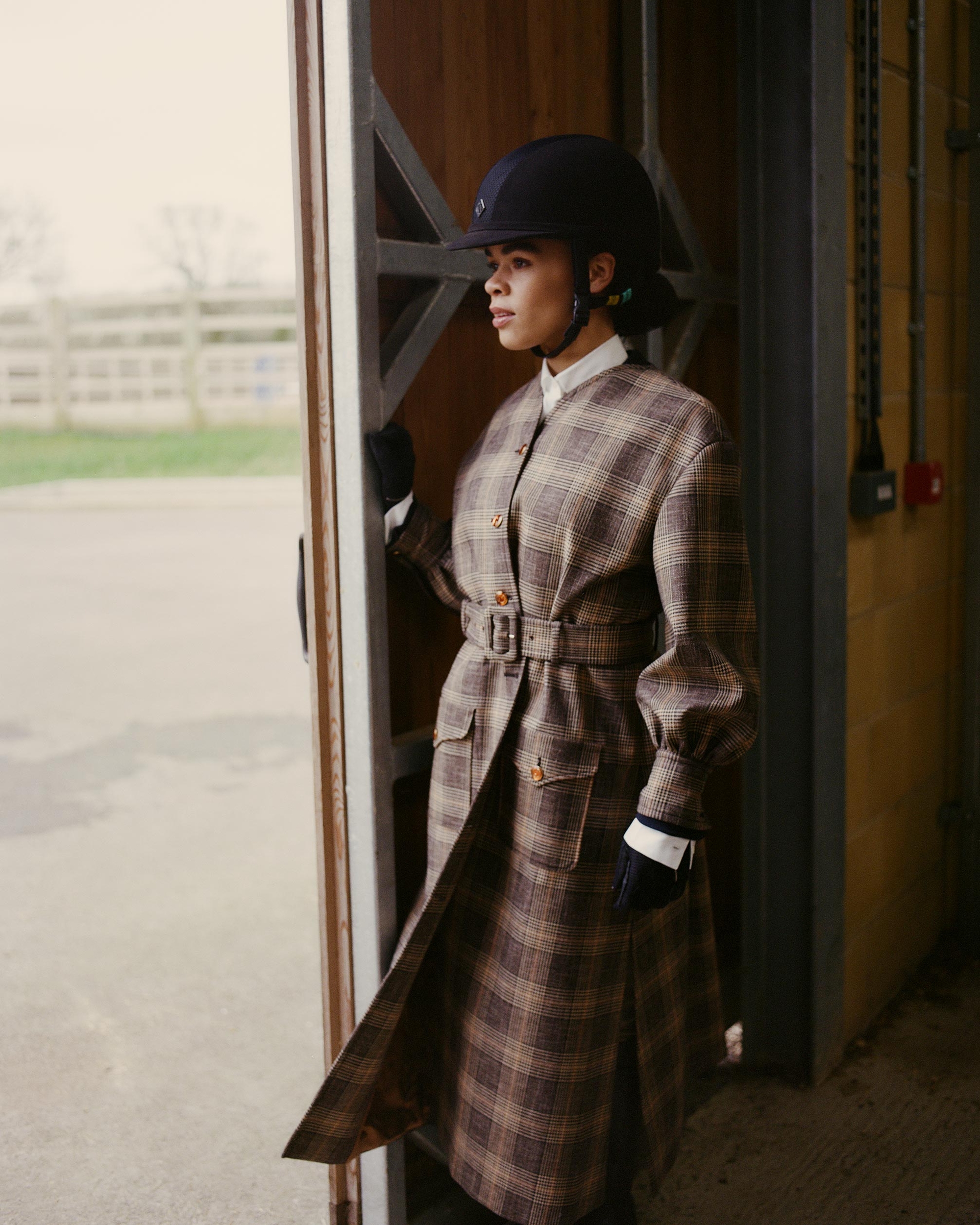
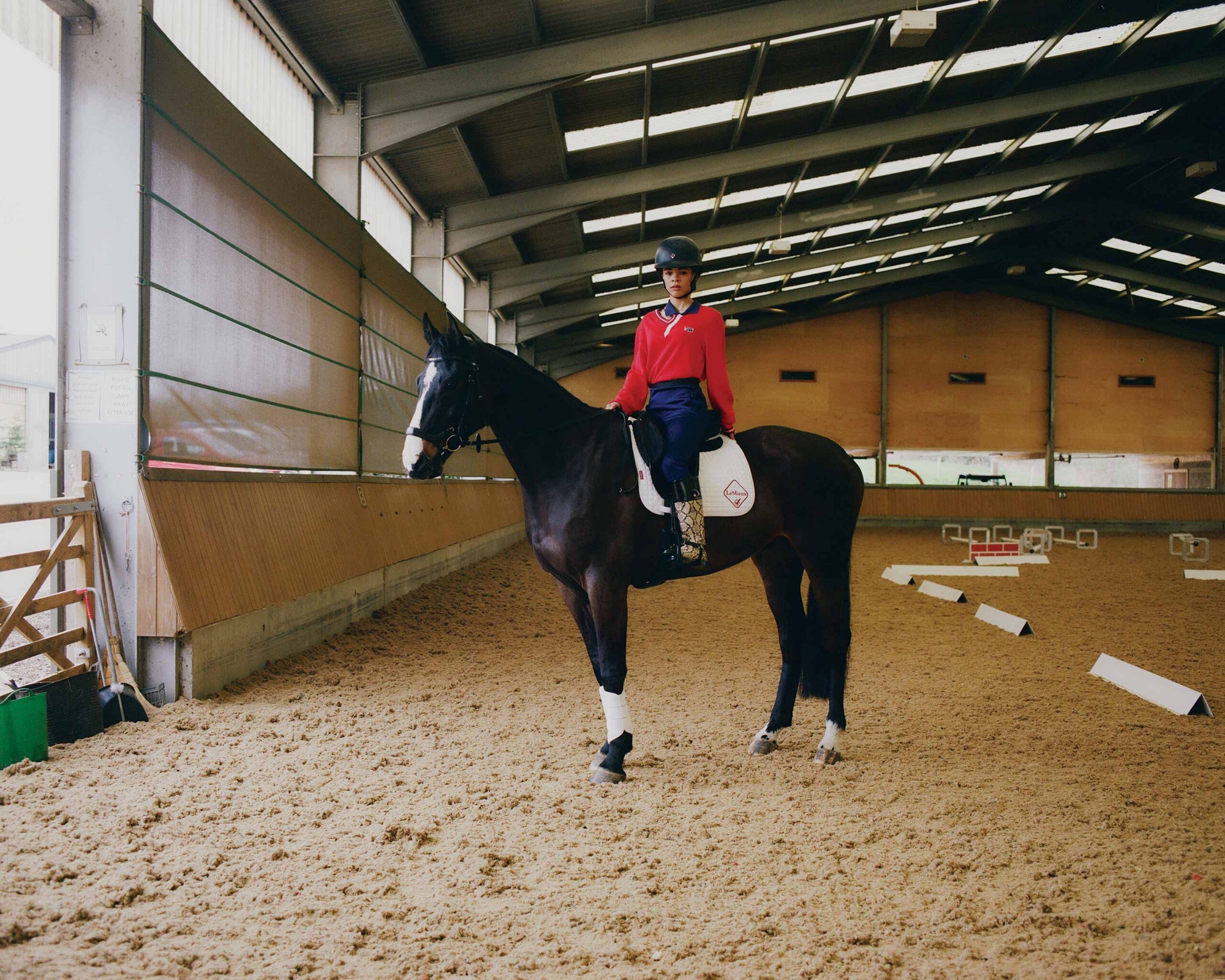
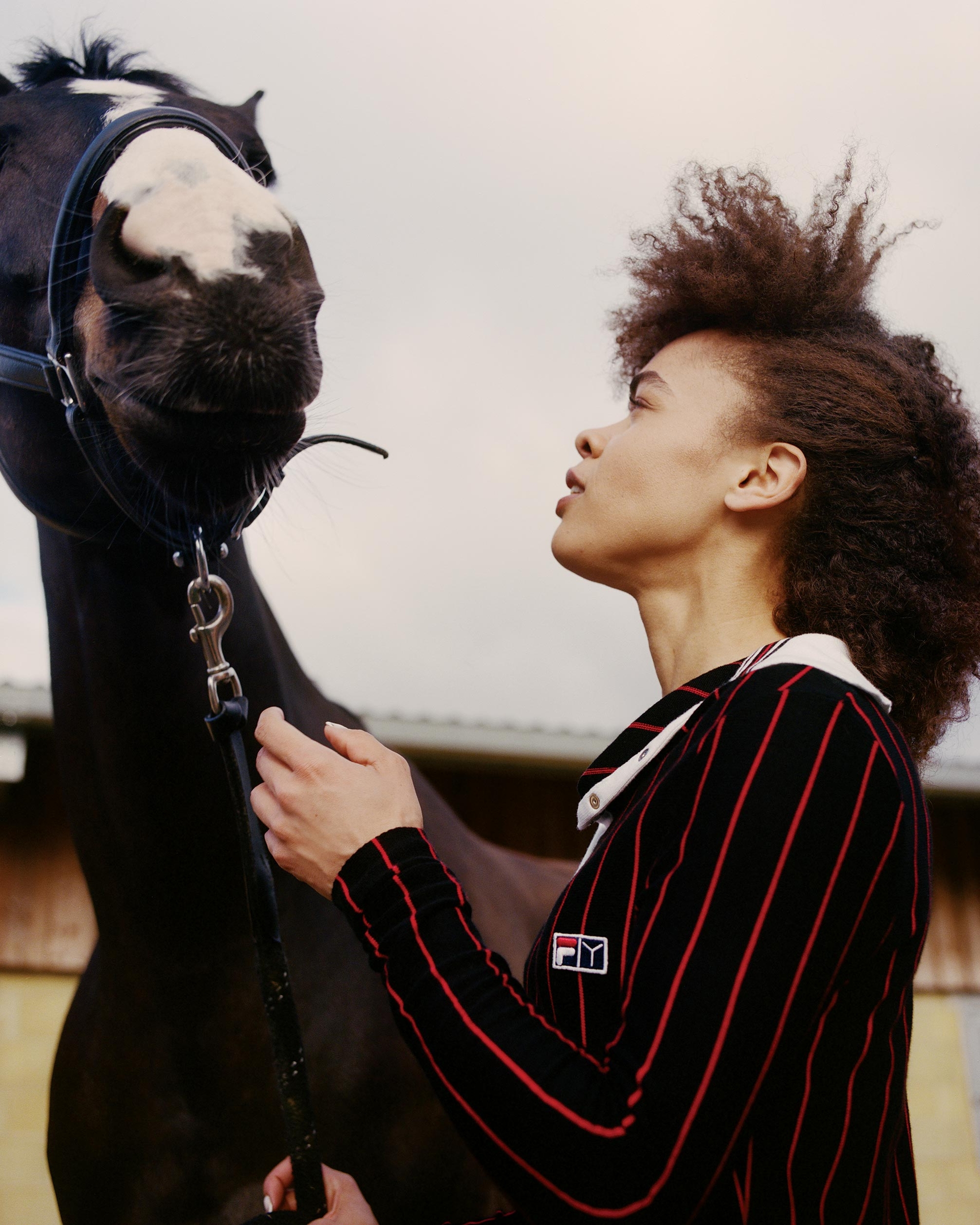
Lydia Heywood is trotting round the competition warm-up at the Tweseldown Racecourse in Hampshire, the picture of elegance and composure in her nipped-in navy jacket atop her horse Mink, when the bay mare throws the mother of all bucks. She explodes into the air, as if resisting being beamed up by an invisible UFO. A split second later, Heywood has her back under soft control, without missing a beat or budging an inch from the saddle. In 2019, Mink managed to leap over an elderly gentleman at this very venue when the Red Arrows suddenly flew by and spooked her.
“We must have gone nine metres,” Heywood recalls. “A lot to handle on a four-year-old. But we won. A day to remember.”
At the age of 25, Heywood is already making her mark on equestrian sport as an accomplished and trailblazing event rider representing Jamaica. Eventing is equestrian triathlon: you compete in dressage, showjumping and at a gallop over cross-country fences, slopes and through water obstacles, and you are expected to master all three disciplines, when the majority of riders spend a lifetime just trying to get semi-decent at one. This year, Heywood will be competing at two-star shows with a view to go all the way to four-star –the Champions League finals of the horse world – and the big goal: the Olympics.
It’s a tough sport to succeed in, and that’s before you add the racial discrimination Heywood has faced all her life as a black rider with a British mother and Jamaican father.
“People double-take at me all the time,” she says when we meet a few days earlier at the yard in Wiltshire where she shares a barn with her trainer, GB gold medallist Phoebe Locke. “There’s been no representation in magazines here in the UK, so people are genuinely shocked to see a black girl on a horse.”
Heywood has experienced horrible abuse from yard owners in the past, including one who, unprompted, told a business partner to keep her on a tight leash. “You’re always on the back foot. You’ve got to prove that you’re almost palatable. I’ve had years of trying to be palatable.”
Determined to make things better for the new horsey generation and create representation to mirror the outside world, Heywood has founded Cool Ridings, a programme that champions diversity in equestrian sport. Through mentoring and sponsorships, it gives young black and mixed-race riders the support, tools and work placements to take their equestrian careers all the way to the top – an idea that came while Heywood was volunteering her time at Ebony Horse Club in Brixton, a project that also spawned a learning series for Horse & Country TV.
“I’m not the first black rider, but there are reasons that people have fallen out of love with the sport. It’s very isolating,” she says, noting that she lacked the usual Pony Club friendship groups growing up and that even today, her support team is small, consisting of her trainers and her friend Mia Benton, an equine photographer.
“We can change that. We’ve got some really promising riders coming up through the ranks wanting to represent developing nations,” she says, patting her handsome black gelding Flynn over his stable door. Cool Ridings’ riders could soon be flying the flag for countries such as Mauritius, Saint Lucia, Kenya or, in the case of university student and budding event rider Tianna Patterson, Saint Vincent: “When I told Tianna she could be the best rider from Saint Vincent, her jaw just dropped. I just see myself in all of them. If I had funds now I’d be building a yard for developing nations to all train together.”
Connecting with her Jamaican heritage and getting her dual nationality – this with the help of His Excellency Seth George Ramocan at the High Commission of Jamaica in London, since Heywood doesn’t have any contact with her father – has really helped Heywood come into her own. Heywood says she’s experienced racism from the white side of her own family and has written people out of her life because of it. “[Jamaica] felt like home very quickly when I landed. Like, wow, these people, their mannerisms are like mine,” she beams. She is now working on getting the UK’s equestrian organisations involved with bringing more accreditations to the Caribbean islands to help secure key roles for their riders in the UK.
Brought up in Cheltenham, Heywood got her start at a local riding school at the age of ten. “Once I got in the saddle I just wanted to be there every day,” she says. That turned into a first plodding pony of her own, and then a second sports-car type that gave her a taste of real showjumping. In 2012 she caught the eventing bug at a yard with a cross-country course, where she and the owner’s daughter would spend summers zooming over log wall fences. By Heywood’s side has been her mother Claire, who was recently diagnosed with motor neurone disease.
“I lost my training partner and main person. It’s been a big knock. I keep relaxed and try not to pass on any tension to the horses, but it’s hard sometimes. I had a shit dressage show last week. I never bring emotion to the yard, but I just felt really sad getting ready on my own to drive to the show. Mum should be enjoying these two horses with me,” Heywood says of Mink and Flynn. Both seven, they were purchased as gangly youngsters and are in a completely different league to her previous horse, Billy. “A 1.15m [fence] is just where these guys start to operate. They are much more talented. I feel like I have to alter my riding and it’s exciting.”
Heywood is a remarkably beautiful rider, and you can see why young riders flock to learn from her. Quiet, correct and extremely sympathetic, her personality shines through in her riding, as does her love for her horses, which she says is like that of “a family dog times ten.” Her voice breaks a little when she speaks of how she wishes her mum could be here with her to enjoy the horses. “I look at them and they just make me laugh. Some of the professional yards I’ve been at on work experience, the horses are meant to stand still and be almost robotic in the way that they go about their daily tasks and behave themselves always but I love the character my horses have.”
There is an incredible laser focus to Heywood. Self-funded, she juggles a corporate job at insurers A-Plan with her professional riding career to pay for the endless outgoings for her horses’ care. (Monthly livery such as Heywood’s is easily more than a mortgage.) At secondary school she was already running a business selling horses with horse dealer Joanne Holder and travelling to Ireland to show horses at auction. Recently, she has taken on a lecturing role as a Diversity, Equality and Inclusion consultant at the Royal Agricultural University.
Black riders, Heywood points out, are up against lots of stereotypes. She puts on a matter-of-fact voice: “‘If black people wanted to ride, then they would’. Oh, right, okay. So, in 1956 when Badminton Horse Trials were first televised on TV and all the royals were doing it, do you think that was a welcoming atmosphere for a black family to come into? And in 1956, were they allowed to take management positions in corporations? No. Race relations weren’t even brought in until the 1960s.” Without the generational wealth, equestrian sport can be out of reach. “We can play the waiting game and let rich black families participate when they want to, or we can actually start paving a way for people to participate.”
Getting her first hat turned into a traumatising experience when sales assistants told ten-year-old Heywood “how troublesome my hair was”. She spent the first 21 years of her life with her hair in a bun and would hide at Pony Club to put her hat on, wishing the ground would swallow her up when she took her hat off. Today, she wears her hair natural, in a side-swept fringe, and she works with renowned hat makers Charles Owen, one of her sponsors, on overcoming such problems. Heywood and Cool Ridings member Olivia Kennedy – who normally has to plait her hair and gets hat headaches – visited their factory in North Wales to work on prototyping a new fit for Afro-Caribbean riders. “It was really emotional. Olivia was crying because she was like, ‘This hat fits? I’ve never had a hat that fits.’”
Another challenge is getting parents on board. “I think the parents have got to realise it’s a credible career for a mixed race or black child. There aren’t any role models out there enjoying their lives at the top of the sport with good money in the bank like Usain Bolt or Serena Williams,” Heywood points out. But unlike Heywood, whose white British mum has chaperoned her around the equestrian world and made her feel safe, Cool Ridings members with black parents have told her of their parents being treated like second-class citizens, with doors closed in their faces. “It’s hard to keep training towards shows when you know those shows might not even treat you right,” Heywood says.
These days, Heywood is usually accompanied to shows by her boyfriend, retired boxer Omran Akbari. “I kind of feel like people have responded differently to me with my boyfriend than how I was received when my mum was alongside me. He’s an Iranian man and me plus Iranian man looks very foreign as opposed to me plus my mum.”
Power and determination are exactly what boxing coach Akbari admires in his girlfriend and her fellow equestrians. “I call them gladiators,” he says of their resilience and work ethic. “In boxing, it’s just you against the other competitor. This is teamwork between two people, the human and the horse.” And, he adds, it’s the only sport where women and men compete against each other, with no age limit.
What makes a great horsewoman? To Heywood it’s patience and understanding – and a strong core when your horse throws some surprise shapes. “These horses, they’re complex creatures, aren’t they? It’s important to know that they’re beings that have emotional needs. I like a bit of praise. Make them more comfortable in their own skin. You’ve got to have that empathy,” she says.
The dream is still to produce or get a four-star horse. Typically, pro riders form relationships with owners of top horses, as this affords them rides of a different calibre, while the owner gets the best training of their horse. So far, this arrangement has eluded Heywood, who has been told UK owners won’t support a rider representing another nation.
“I don’t want to come across as entitled because lots of people produce their own horses. These horses haven’t come on a plate. I’ve had to sell lots of cobs to get here,” she laughs. “It just shows me I’ve got to grow excitement in my circles, which is a totally new demographic for the sport.” She wishes GB riders would be more interested in projects. “It hasn’t occurred to them that a more diverse sport will increase the sponsorships and prize funds for them as well.” Today at Tweseldown, she’s certainly getting noticed: Heywood and Mink cruise through their classes, taking second place, just 0.2 penalties from the winning spot.
We return to the subject of whether people have been doing double-takes. “I suppose they could be looking because I have big sponsors now, or because they recognise me and nothing to do with my ethnicity. I have always tried to think that if people look twice as long it’s a positive thing because you’re riding your horse beautifully. I’ve got confidence in my ability and I turn my horses out well,” she says as she loads Mink onto the horsebox for the journey home.
Ahead lies the season’s big shows, and more Cool Ridings ventures. “I almost feel people are puzzled as to why I’m doing this sometimes,” she says of the latter. “My family have been puzzled and think I should just focus on my own career. But what’s better than rising alone? Rising as a team. It’s what really motivates me. I don’t want to ride alone. We should all ride together.”



